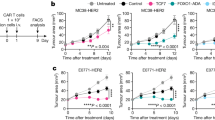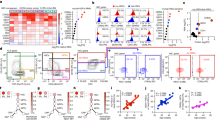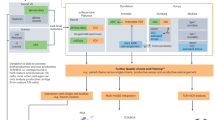Abstract
THE haemopoietic system has three main compartments: multi-potential stem cells, intermediate stage progenitor cells and mature cells. The availability of simple reproducible culture systems1 has made possible the characterization and purification of regulators of the progenitor cells, including colony-stimulating factors and interleukins. In contrast, our knowledge of the regulators involved in the control of stem cell proliferation is limited. The steady-state quiescent status of the haemopoietic stem cell compartment is thought to be controlled by locally acting regulatory elements present in the stromal microenvironment2, but their purification has been hampered by the lack of suitable culture systems. We have recently developed a novel in vitro colony assay that detects a primitive cell (CPU-A) 3 which has similar proliferative charac-teristics, in normal and regenerating bone marrow, to the CFU-S (haemopoietic stem cells, as defined by the spleen colony assay4) and which responds to CFU-S-specific proliferation regulators. We have now used this assay to purify to homogeneity a macrophage-derived reversible inhibitor of haemopoietic stem cell proliferation (stem cell inhibitor, SCI). Antibody inhibition and sequence data indicate that SCI is identical to a previously described cytokine, macrophage inflammatory protein-lα ( MIP-lα), and that SCI/MIP-lα is functionally and antigenically iden-tical to the CFU-S inhibitory activity obtained from primary cultures of normal bone marrow cells5. The biological activities of SCI/MIP-lα suggest that it is a primary negative regulator of stem cell proliferation and that it has important therapeutic appli-cations in protecting haemopoietic stem cells from damage during cytotoxic therapies for cancer.
This is a preview of subscription content, access via your institution
Access options
Subscribe to this journal
Receive 51 print issues and online access
$199.00 per year
only $3.90 per issue
Buy this article
- Purchase on Springer Link
- Instant access to full article PDF
Prices may be subject to local taxes which are calculated during checkout
Similar content being viewed by others
References
Metcalf, D. Molecular Control of Blood Cells (Harvard University Press, 1988).
Toksoz, D., Dexter, T. M., Lord, B. I., Wright, E. G. & Lajtha, L. J. Blood 55, 931–936 (1980).
Pragnell, I. B. et al. Blood 72, 196–201 (1988).
Till, J. E. & McCulloch, E. A. Radiation Res. 14, 213–222 (1961).
Lord, B. I., Mori, K. S., Wright, E. G. & Lajtha, L. G. Br. J. Haematol. 34, 441–445 (1976).
Wright, E. G. & Lorimore, S. A. Cell Tissue Kinet. 20, 191–203 (1987).
Ralph, P., Prichard, J. & Cohn, M. J. Immun. 114, 898–905 (1975).
Wolpe, S. D. et al. J. exp. Med. 167, 571–581 (1988).
Davatelis, G. et al. J. exp. Med. 167, 1939–1944 (1988).
Sherry, B. et al. J. exp. Med. 168, 2251–2259 (1988).
Saiki, R. K. et al. Science 330, 1350–1354 (1985).
Yang, Y. C. et al. Cell 47, 3–10 (1986).
Frindel, E. & Guigon, M. Expl Hematol. 5, 74–76 (1977).
Lenfant, M. et al. Proc. natn. Acad. Sci. U.S.A. 86, 779–782 (1989).
Lord, B. I., Mori, K. J. & Wright, E. G. Biomedicine 27, 223–226 (1977).
Wolpe, S. D. & Cerami, A. FASEB J. 3, 2565–2573 (1989).
Wright, E. G., Sheridan, P. & Moore, M. A. S. Leukaemia Res. 4, 309–319 (1980).
Lord, B. I. & Wright, E. G. in Maturation Factors and Cancer (ed. Moore, M. A. S) 323–333 (Raven, New York 1982).
Hrynuik, W. & Levine, M. N. J. clin. Oncol. 4, 1162–1166 (1986).
Criswold, D. P. Jr et al. Cancer Res. 47, 2323–2327 (1987).
Spangrude, G. J., Heimfield, S. & Weissman, I. L. Science 241, 58–62 (1988).
Lord, B. I. & Spooncer, E. Lymphokine Res. 5, 59–72 (1986).
Ploemacher, R. E. & Brons, N. H. C. Expl Hematol. 16, 27–32 (1988).
Szilvany, S. L., Lansdorp, P. M., Humphries, R. K., Eaves, A. C. & Eaves, C. J. Blood 74, 930–939 (1989).
Laemmli, U. K. Nature 227, 680–685 (1970).
Morrissey, J. H. Analyt. Biochem. 117, 307–310 (1981).
Wolpe, S. D. et al. Proc. natn. Acad. Sci. U.S.A. 86, 612–616 (1989).
Author information
Authors and Affiliations
Rights and permissions
About this article
Cite this article
Graham, G., Wright, E., Hewick , R. et al. Identification and characterization of an inhibitor of haemopoietic stem cell proliferation. Nature 344, 442–444 (1990). https://doi.org/10.1038/344442a0
Received:
Accepted:
Issue Date:
DOI: https://doi.org/10.1038/344442a0
This article is cited by
-
The Chemokine CCL3 Regulates Myeloid Differentiation and Hematopoietic Stem Cell Numbers
Scientific Reports (2018)
-
Leukemia cell infiltration causes defective erythropoiesis partially through MIP-1α/CCL3
Leukemia (2016)
-
LECT2 drives haematopoietic stem cell expansion and mobilization via regulating the macrophages and osteolineage cells
Nature Communications (2016)
-
Correlation of transforming growth factor beta-1 gene polymorphisms C-509T and aplastic anemia
Comparative Clinical Pathology (2013)
-
Polymerization of MIP-1 chemokine (CCL3 and CCL4) and clearance of MIP-1 by insulin-degrading enzyme
The EMBO Journal (2010)
Comments
By submitting a comment you agree to abide by our Terms and Community Guidelines. If you find something abusive or that does not comply with our terms or guidelines please flag it as inappropriate.



